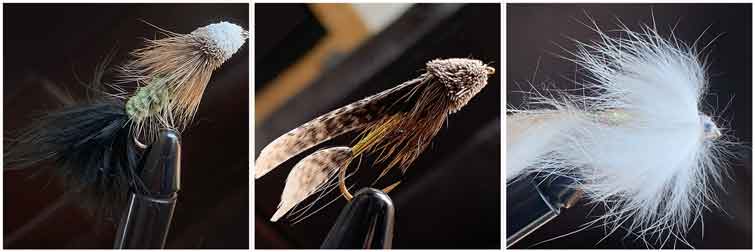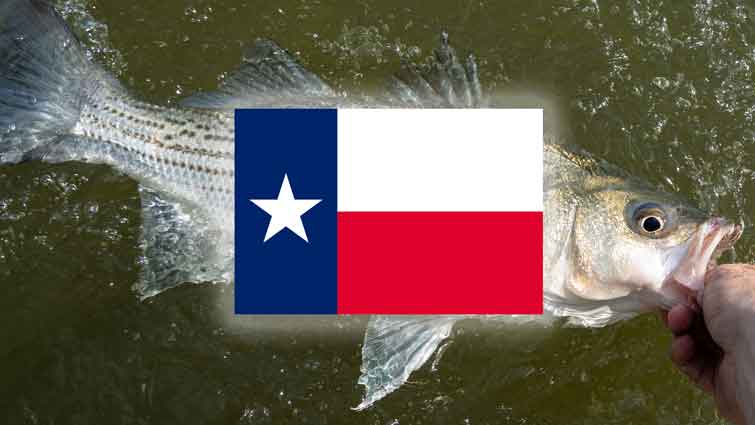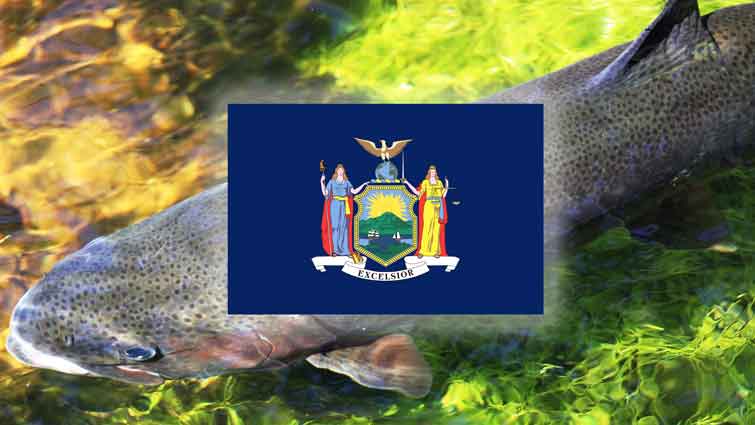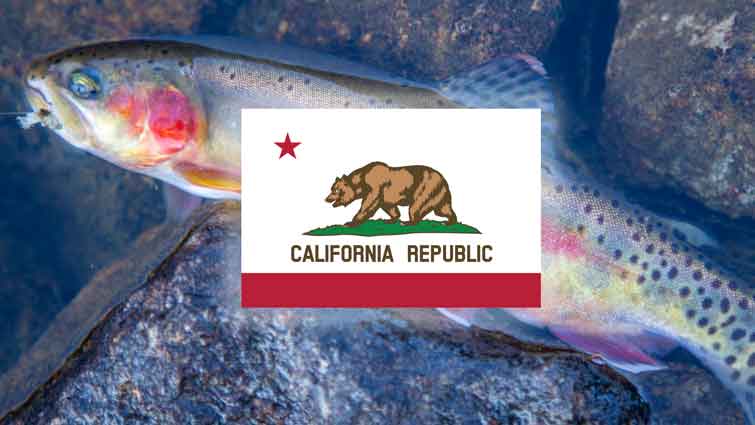Acquiring a fishing license for every state with access to sportfishing can become costly. You want to ensure you're investing in the right locations with easy access, low to moderate fishing pressure, a variety of fish, and are suitable for all levels of experience.
Some of the best places to fly fish in Texas include:
- Devils River
- Blanco River
- Guadalupe River
- Llano River
- Lampasas River
- Pedernales River
- San Gabriel River, and more

Keep reading to find out the best that Texas has to offer in fly fishing. Reach the end, and you'll find the answer to some frequently asked questions about fly fishing in Texas waters.
Best Fly Fishing Rivers in Texas
There are beautiful, diverse, and accessible waters in the state of Texas. Many waters offer low fishing pressure in remote locations with ample populations and species diversity.

1. Devils River
Located in Southwest Texas, Devils River is a hidden gem amid harsh desert terrain. Its remote location makes it one of the most untainted and beautiful fishing spots. Its 94-mile-long crystal clear, natural spring-fed waters supply a bounty for anglers.
Due to the climate, the best time for fishing is sunrise or sunset. With a Texas fishing license, tilapia and catfish are free game. Smallmouth and largemouth bass are catch-and-release only. Be aware of snakes, rapids, waterfalls, and flash floods.

Recommended Fly Patterns for Devils River:
- Clouser Crawdad - Size 6
- Bass Popper - Size 6
- Muddy Buddy - Size 6

2. Blanco River
Located in Wimberly, Texas, Blanco River is 87 miles of natural spring-sourced water. The river is more difficult to access due to many privately held banks. However, you don't need a Texas fishing license to fish from the shore, and rods and reels can be borrowed when available.
The target species at this beautiful spot are Rio Grande cichlids, Guadalupe, carp, sunfish, smallmouth, largemouth, and striped bass. The Spring and Fall are the most productive times to fish this river. Fishing during the Summer is dependent on the water level of the river.

Recommended Fly Patterns for Blanco River:

3. Guadalupe River
Texas Parks & Wildlife stocks this top-rated river in New Braunfels starting in late November and ending in early March. Although most licensed fishing on this river is catch and release, anglers are permitted to keep five trout per day.
In addition to brown and rainbow trout, there are other species like smallmouth, largemouth, and striped bass. The latter species can get quite large, up to 40 lbs, and eat full-grown trout right off angler's lines.

Recommended Fly Patterns for the Guadalupe River:
- Slump Buster with Cone - Black - Size #6
- Glo Bug Red Dot (Egg) - Orange) - Size #10
- San Juan Worm - Size #12

4. Llano River
The scenic, east-flowing Llano River travels 100 miles before joining the Colorado River and helping to form the Lyndon B. Johnson Lake. As the most remote river in the Hill Country of Texas, anglers will likely not cross paths while fishing.
Most days on the river produce a mix of species, from the native Guadalupe bass to sunfish, catfish, gar, carp, and more. Largemouth and Guadalupe bass are best to fish when the spring-fed water is clear. Anglers are encouraged to practice moderation when harvesting their catch, especially with the native species.

Recommended Fly Patterns for the Llano River:
- Zoo Cougar - Yellow - Size #6
- Closer Crayfish - Size #6
- Muddler Minnow - Size #4

5. Lampasas River
The west traveling Lampasas River is one of many tributaries to the Brazos River. While being a favorite of a few local anglers, the river, just outside of Austin, receives very little activity otherwise. The river's small streams produce several ideal pools and shallow runs.
Home to seven different species, including the white bass and bluegill sunfish. The best time to fish is when the temperatures are below 80 degrees. Though the river is mostly clear, its low gradient means that sediment and silt from sandy loams and clay can suspend in the pools for long periods.

Recommended Fly Patterns for the Lampasas River:
- Half Chernobyl Brown/Orange - Size #10
- Kaufman StoneKaufman Stone - Black #8
- Double Bunny Olive & White - Size #6

6. Pedernales River
Like its counterpart, the Pedernales River also runs 100 miles and meets with the Colorado River. The scenic beauty of the rivers boasts of tumbling waterfalls and natural limestone. The limestone in the river bed creates pools, which hold decent-sized bass and carp.
In addition to smallmouth, largemouth, and white bass, the river has common carp, spotted gar, and blue and channel Catfish. The higher temperatures in the river will cause fish to dive deep into the pools. It's not uncommon for fish, especially bass, to strike hard at a fly as soon as it hits the water.

Recommended Fly Patterns for the Pedernales River:

7. San Gabriel River
Located near Georgetown, this hill country river has three forks, the North, Middle, and South. The North and South are more popular fishing destinations because the Middle is surrounded by mostly private land. The water is green and surrounded by lush vegetation, including pecan and cottonwood trees that provide shade from the heat.
The river contains eight species of fish, including the redbreast sunfish, longear sunfish, bluegill sunfish, green sunfish, Guadalupe bass, largemouth bass, Rio Grande cichlids, and carp. There is a five-bag limit per angler per day.

Recommended Fly Patterns for the San Gabriel River:

8. San Marcos River
The San Marcos River starts at the San Marcos Springs Texas A&M University campus. The river flows roughly 85.5 miles through several counties and meets up with the Guadalupe River. The source of the stream is considered one of the most biologically varying aquatic ecosystems in the United States.
The spring-fed water not only provides constant flow, even in drought periods, but it keeps the water temperatures at a blissful 72 degrees. These conditions make the river suitable to be fished all year round. Species include Guadalupe, largemouth and smallmouth bass, Rio Grande cichlids, and sunfish.

Recommended Fly Patterns for the San Marcos River:
- Zonker - Grizzly - Size #6
- Clouser Crawdad - Size #6
- Bass Popper - Size #6

9. Colorado River
The U.S. Geological Survey says the Colorado River is in the top 20 longest rivers in the country at a staggering 862 miles. Access limitations and long stretches of river between put-ins and take-outs mean there isn't much fishing competition in these waters.
The stretch of the river below Austin is known as an ideal bass fishing spot. In addition to bass, there are catfish, sunfish, gasper goo, and freshwater drum. The fish can range from 7 lbs bass to 15 lbs gasper goo and freshwater drum. The Colorado River holds the current world record for Guadalupe bass caught.

Recommended Fly Patterns for the Colorado River in Texas:

10. Red River and Lake Texoma
The Red Rivers runs along the border between Texas and Oklahoma, eventually meeting up with the Mississippi River. Lake Texoma is a water conservation reservoir on the river boasting 88,000 surface acres. Unfortunately, the two states that share the river don't recognize the other states' fishing licenses. You must acquire both to fish on both sides of the lake or a Lake Texoma license.
Red River and Lake Texoma are known for their striped bass population, offering generous catch limits. A bag limit of 10 and a possession limit of 20 per day. Of that 20 fish limit, only two striped or hybrid striped bass 20 inches or larger can be retained per day. Other species include smallmouth, largemouth, and spotted bass.

Recommended Fly Patterns for the Red River and Lake Texoma:

11. Cypress Creek
The spring-fed Cypress Creek starts at the famed Jacob's Well and eventually joins the Blanco River. The river has free access and private sections that may require payment if accessible. Much of the water is crystal clear and offers a reliable flow for year-round fishing.
Cypress Creek has a plentiful trout population and largemouth, smallmouth, striped, white, and yellow bass. Anglers can fish from shade-covered banks, kayaks, or small boats.

Recommended Fly Patterns for the Cypress Creek:
- Autom Splender - Size #2
- Clouser Crawdad - Size #6
- Double Bunny Black and Olive - Size #6
Best Fly Fishing Lakes in Texas
Here are some of the best lakes and stillwaters in Texas for fly fishing:

1. Canyon Lake
The Guadalupe River formed an 8,500-acre reservoir known as Canyon Lake. The accompanying Canyon Dam releases cold water, maintaining temperatures for the southernmost trout fishing spot in the country. The clear, deep waters and rocky shoreline have dubbed it the "Jewel of the Texas Hill Country."
Catch ranges from the popular striped bass to largemouth, smallmouth, white, and Guadalupe bass, common carp, catfish, and longnose gar. Striped bass can get as large as 30+ lbs. Fishing is good all year round, although anglers may have to change their tactics depending on the season.

Recommended Fly Patterns for Canyon Lake:
- Muddy buddy - Black - Size #6
- Trophy Dungeon - Black - Size #8
- Slump Buster with Cone - Black or Olive - Size #6

2. Lake Anahuac
Lake Anahuac is a 5,059-acre artificial lake located east of downtown Houston. The lake is fed by the Turtle Bayou watershed and the Trinity River. This location provides both freshwater and saltwater fishing.
There are several prime times for fishing on the lake: early morning, just after midday, and early evening. Species are typical to Texas waters, like largemouth and white bass, speckled trout, blue and channel catfish, and redfish. More special catches are southern flounder, crappie, and bowfin. One day in the year, you can fish without a license or permit, but no motorized boats are allowed on the lake.

Recommended Fly Patterns for Lake Anahuac:

3. Lake Conroe
Lake Conroe, an hour's drive from Houston, has been the site of many bass tournaments. The 22,000-acre lake has 157 miles of shoreline. It's a popular location for recreational activities, so there may be a bit of competition between those sport fishing and those jet skiing, kayaking, swimming, etc.
The largemouth bass is the most popular species in Lake Conroe, but it also has an abundant population of hybrid striped bass, channel catfish, and bluegills. There are also crappie, bowfin, carp, smallmouth buffalo, and gar.

Recommended Fly Patterns for Lake Conroe:
- Zonker - Grizzly - Size #10
- Zoo Cougar - White or Yellow - Size #6
- Double Bunny Olive & White - Size #6
Best Coastal Fly Fishing in Texas

1. Texas coast between Port O'Conner and Rockport
The coast between Port O'Conner and Rockport is a convenient location of emerald waters and an ample population of sportfishing. Due to sportfishing being one of the primary industries in these coastal cities, there are plenty of amenities and facilities for anglers.
Year-round you can fish redfish, but in the changing season, you also have black drum, sheepshead, sea trout, tarpon, and flounder. The saltwater flats and crystal clear water allow you to spot your prey as far as 100 feet away.

Recommended Fly Patterns for the Gulf Coast - Port O'Connor:
- Trophy Dungeon - White-Red - Size #8
- Double Bunny Black and Olive -Size #6
- Muddy buddy - Black - Size #6

2. Laguna Madre
Laguna Madres is a shallow lagoon that runs approximately 130 miles off the west coast of Texas. The lagoon starts south of Corpus Christi and heads down to the Mexican border. The saltwater flats offer a variety of game for anglers.
In the warmer months, anglers can catch kingfish, cobia, tarpon, and possibly jack crevalle. All year round, anglers will see redfish, sheepshead, flounder, black drum, sea trout, and more.

Recommended Fly Patterns for Laguna Madre:

3. Houston
Houston is one of the largest metropolitan cities in the country. Dubbed the "Bayou City," there are many streams and unique waterways outside the norm for sportfishing that anglers can try. Anglers can choose between local lakes, urban "concrete flats," and Pinewoods' spring-fed waters.
More popular Houston fishing destinations include Mary Jo Peckham Park, McGovern Lake, Tom Bass Park, and Lake Livingston. Depending on what stream or waterway anglers choose to fish, there are largemouth and spotted bass, panfish, gar, and bowfin.

Recommended Fly Patterns for the Fly Fishing in Houston:
- Double Bunny Black and Olive -Size #6
- Zoo Cougar - White or Yellow #6
- Slump Buster with Cone - Black - Size #6

Additional Facts about Fly Fishing in Texas
Is Texas good for fly fishing?
Yes, Texas is a good up-in-coming location for fly fishing. The state has saltwater and freshwater fly fishing, which means it has a diverse variety of sportfishing for anglers. There are 100 lakes and over 80,000 miles of water for anglers to explore. Ideal temperatures for fishing year-round and little fishing pressure make it worth a try for any angler.
Is there anywhere to fly fish in Texas?
There are ample locations for fly fishing in Texas. Many have been mentioned in this article, but there are many more not on this list that would offer any angler the opportunity to fly fish with ample populations of fish and low fishing pressure.
Does Texas have trout fishing?
Yes, Texas does have trout fishing. A few locations have been mentioned in the list, but there are locations not listed for both saltwater and freshwater trout. Sabine Lake, Galveston Bay, and East/West Matagorda Bay for saltwater. For freshwater, you have Canyon Trailrace, Garner State Park, and Possum Kingdom Lake.
What species of fish are most popular to catch when fly fishing in Texas?
The most popular species of fish in Texas are bass. More specifically, the native Guadalupe bass, as well as largemouth and smallmouth bass. An honorable mention is the trout, which is always a favorite among fly fishers.

Texas Fishing Regulations
Texas Parks and Wildlife have general fishing regulations regarding licensing, identifying game fish, unlawful activities, and more. Here are a few of those regulations; for an exhaustive list, please visit the Texas Parks and Wildlife website.
- A valid Texas fishing license with the appropriate endorsement (saltwater, freshwater) is needed unless under the age of 17 or a Louisiana or Oklahoma resident 65 or older. Louisiana residents must have a valid Louisiana Recreational Fishing License.
-
Game fish can only be taken by pole or line unless otherwise specified. The species not already mentioned in this article are as follows:
- Mackerel: king, Spanish
- Marlin: blue, white
- Pickerel
- Sharks
- Snook
- Spearfish, longbill
- Swordfish, broadbill
- Tripletail
- Wahoo
- Walleye
- Catch and release fish are not considered in possession. Any fish retained in a holding device is considered in possession and are subject to length and bag limits.
- It is unlawful to disturb, take or kill sea turtles, endangered species of fish (sawfish, shovel-nosed sturgeon, paddlefish, and more), diamondback terrapin, or marine mammals.
Conclusion
When it comes to fly fishing, Texas is an up-and-coming state with a lot to offer anglers. With diverse locations and ample opportunity, it is a great place to try fly fishing for the first time or the hundredth. Be sure to review the regulations set forth by Texas Parks and Wildlife to ensure a safe and fun experience for all.




